I am not a big fan of gulls, at least not yet. Such refined bird watching tastes are beyond me. This is not to say that I’m not terribly impressed by these cunning, hardy, adaptable avians. Gulls are survivors through and through; you mess with them at your peril. I admire them plenty. I just can’t stand trying to pick out rare gulls from the teeming ranks of the usual suspects. White-winged gulls may excite me as much as the next guy, but I’m not quite ready to cover the waterfront waiting for them to come in. Not when the following three species make up 99% of my gull sightings:
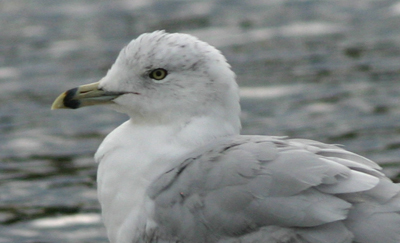
Ring-billed Gull
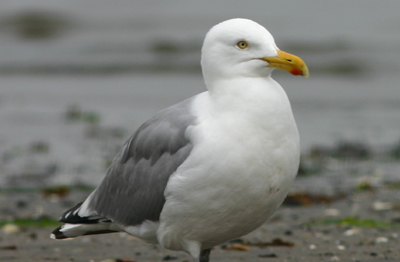
Herring Gull
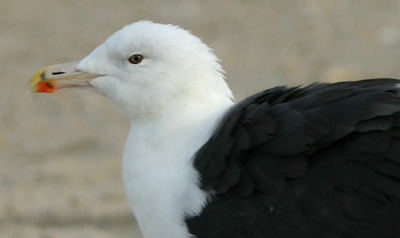
Great Black-backed Gull
Of these three, the first two appear most frequently. The Great Black-back, however, can sometimes outnumber them in coastal settings. Laughing Gulls are also fairly common in the Northeast, but only in the warmer months.
What are your usual gulls?







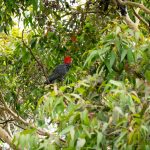
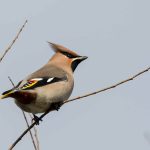
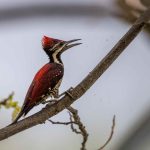



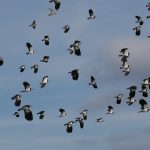
Around here, silver gulls outnumber the others by a huge margin. Pacific gulls are the second most abundant.
Mike,
You have always been my favorite gull.
Seth
I’m with you, Mike. Gulls are hard. I don’t know how common the Great Black-backed Gull is around me, but I’d never knowingly seen one until it was pointed out to me by my partner for the Presqu’ile CBC–sounded exotic to me! Herring and Ring-billed we have plenty.
Your three plus Laughing down here in DC as well. I enjoy new ones on the rare occasion that they show up (like the Bonapartes gull in southern Ohio many years ago in winter), but I don’t seek them out either. Now, terns, OTOH….
Coming from the midwest where there were none nearby, it’s a joy to see them here in California. I suppose over time that may change though.
Gulls are tough. Like you, I haven’t developed a taste for sitting there and scanning through a million gulls to find the odd one. I’ll do it periodically, but it’s not at the top of my list. Last year, I bought the two gull videos featuring Jon Dunn that ABA sells. They are educational to a point, but sitting through them is like getting your teeth drilled. Boring with a capital B.
Mike:
We’re lucky on the upper Texas coast to have a variety of gulls. The interesting thing is that here, you never know what might show up. Like you, I don’t have the patience to look through large flocks for that rarity, but when one shows up, it’s pretty exciting.
Regular:
Laughing (most abundant)
Herring
Ring-billed
Boneparte’s (w)
Franklin’s (spring & fall)
Rare but not accidental:
California
Lesser Black-backed
Glaucous
Greater Black-backed
Accidental:
Sabine’s
Yellow-footed
Little
Thayer’s
Mew
Kelp (and Kelp x Herring) – An interesting story. I should blog about it sometime…
Bill
We have the same three in DC, plus Laughing in summer and a few Lesser Black-backed in winter.
Bill, you folks on the upper Texas coast are spoiled for birds. There’s no way around it.
Enchilada, I’m with you. I always stop for terns.
Robert, the West Coast has some fantastic gulls. Heermann’s is nothing short of spectacular. I’m also partial to Larus californicus with its red and black bill markings. As the song laments, I wish they all could be California Gulls.
Seth, my friend, you’re like school in summer…
Ah gulls, I DO enjoy them, and admire them, and their challenges. Strangely enough there is something satisfying about picking out the gull with the different coloured eye out of the many.
Our usual suspects? Glaucous Gulls are the most numerous, and then Thayer’s Gulls after that. Iceland gulls do live here, and it is most challenging trying to find them amongst the Glacous. And of course there are the out of town gulls, Ivory, Black-legged Kittiwakes, and Sabines (my nemesis bird). Ross’s is a possibility but not very likely. I’m fairly sure, but not a hundred percent positive that I saw a Greater Black Backed Gull out on the land one spring.
Next thing you’re going to say is that you don’t like fall Warblers
On the contrary, Clare, I like fall warblers quite a bit. I’m just not one of those contrarians who prefers them over the spring birds!
Here in my country we’ve only Laughing
Gulls are a victim of bias for many of us born and raised on the Gulf Coast. They become a thing more to be avoided than studied. Anyone having culled the bycatch on a shrimp boat with them raucously squawking overhead will understand. 🙂